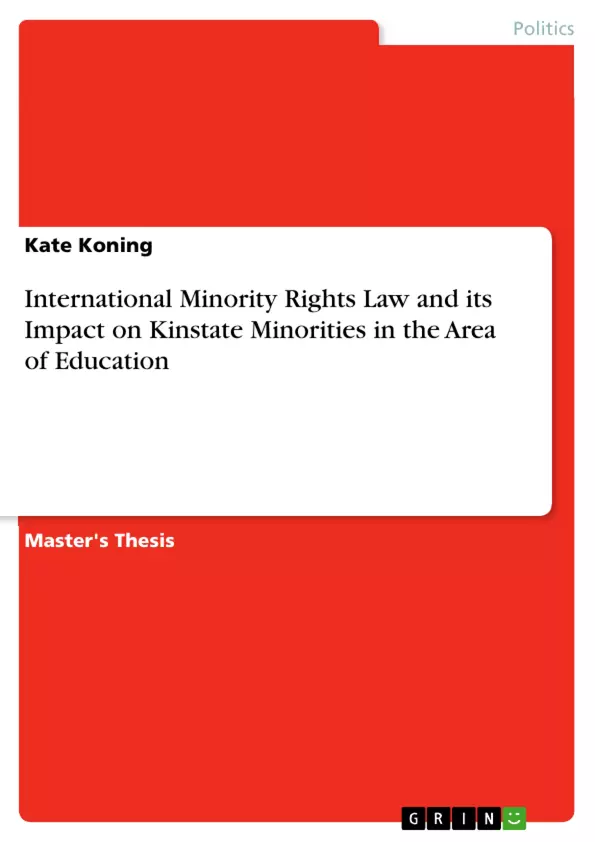The Council of Europe created the first legally binding international treaty for national minorities in Europe for language rights called the European Charter for Regional and Minority Languages (ECRML) in 1992. Little is discussed in academia about its effects concerning kinstate minorities who are already protected due to state legislation and unilateral or bilateral agreements. This thesis examined the ECRML and its impact in the context of language education rights concerning the Danish and German minorities living in the Schleswig border region. Using content analysis and interviews with stakeholders, it was found that it helped re-enforce and re-assure minority language rights, created formalization in the area of language education rights, re-instating funding equality, raised awareness in minority education issues to the governments involved and re-instated funding equality in the area.
Inhaltsverzeichnis (Table of Contents)
- Introduction
- The German and Danish Minorities' Situation: Past and Present
- Analysis of Article 8 and the State's Chosen Obligations in Education
- Denmark and Germany: Their selected Obligations
- ECRML: Article 8 Analysis
- The ECRML State and Evaluation Reports
- Denmark and the German Minority
- Germany and the Danish Minority
- Article 8 and its Effects on the German and Danish Minority
Zielsetzung und Themenschwerpunkte (Objectives and Key Themes)
This thesis examines the European Charter for Regional or Minority Languages (ECRML) and its impact on language education rights for Danish and German minorities in the Schleswig border region. It seeks to understand how the ECRML has influenced the protection and promotion of these minority languages, particularly in the context of education.
- The role of the ECRML in protecting and promoting minority language rights.
- The impact of the ECRML on language education for Danish and German minorities in Schleswig.
- The analysis of Article 8 of the ECRML and its implementation by Denmark and Germany.
- The effectiveness of state legislation and policies in ensuring the protection of minority language rights.
- The importance of civil society engagement in advocating for minority language rights.
Zusammenfassung der Kapitel (Chapter Summaries)
The introduction provides an overview of the ECRML and its significance in protecting minority languages in Europe. It highlights the importance of state commitment, civil society engagement, and the role of European legal bodies in ensuring the effectiveness of the ECRML.
Chapter 1 examines the historical and current situation of Danish and German minorities in Schleswig, focusing on their language rights and challenges. Chapter 2 delves into Article 8 of the ECRML, analyzing the obligations that Denmark and Germany have chosen to uphold regarding minority language education. Chapter 3 explores the state and evaluation reports related to the ECRML in Denmark and Germany, highlighting specific actions and developments concerning the implementation of the charter. Chapter 4 examines the specific impact of Article 8 on the German and Danish minorities in Schleswig, evaluating the effectiveness of the ECRML in promoting language education rights.
Schlüsselwörter (Keywords)
The key themes and concepts covered in this work include: European Charter for Regional or Minority Languages (ECRML), minority language rights, language education, Danish minority, German minority, Schleswig, state obligations, civil society engagement, state evaluation reports, impact assessment.
Frequently Asked Questions
What is the European Charter for Regional or Minority Languages (ECRML)?
It is the first legally binding international treaty created in 1992 to protect and promote language rights for national minorities in Europe.
How does the ECRML impact the Schleswig border region?
The charter has helped reinforce minority language rights for the Danish and German minorities, ensuring funding equality and formalizing education rights.
What does Article 8 of the ECRML specifically address?
Article 8 focuses on education, outlining the obligations of states to provide or support minority language schooling at various levels.
Why is civil society engagement important for minority rights?
The thesis highlights that stakeholders and minority organizations play a crucial role in advocating for rights and monitoring state compliance.
What were the findings regarding funding equality in education?
The ECRML helped reinstate funding equality for minority education in the regions studied by raising awareness with the involved governments.
- Quote paper
- Kate Koning (Author), 2013, International Minority Rights Law and its Impact on Kinstate Minorities in the Area of Education, Munich, GRIN Verlag, https://www.grin.com/document/272316



